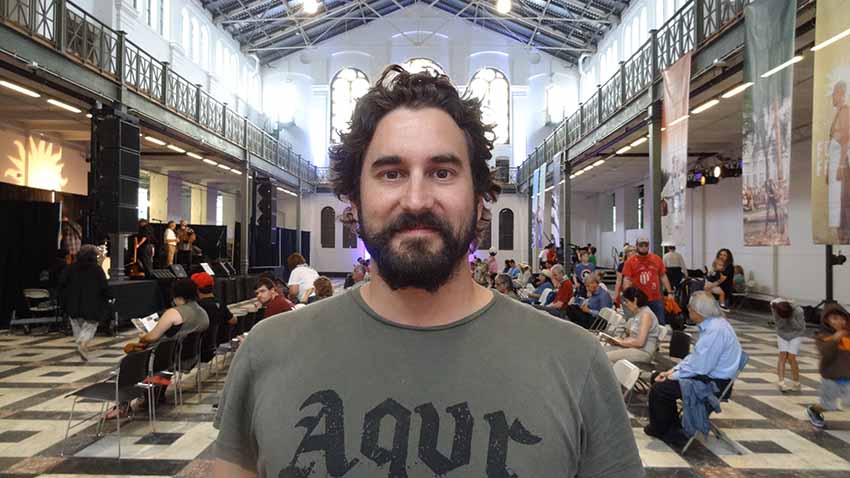Estebe Salgado came to the US with a swimming scholarship, and got his degree in the Exact Sciences. He later delved into the labor market and today enjoys the success of his own company that sells txakoli, cider and wine from the Basque Rioja.
basque heritage worldwide

07/08/2016

ADVERTISING
Estebe Salgado came to the US with a swimming scholarship, and got his degree in the Exact Sciences. He later delved into the labor market and today enjoys the success of his own company that sells txakoli, cider and wine from the Basque Rioja.
Joseba Etxarri. Entreprening youth? You can ask that to Estebe Salgado Agirreazaldegi, who at the age of 18 left Donostia and came to the US on a swimming scholarship while pursuing his mathematics degree at the American University in Washington DC. In Euskadi he had swum in the Easo Club and although he says that he wasn’t a big deal, he had won several competitions and even made it to the state finals. A swimming buddy told him about the possibility of coming to America, which he immediately looked into when it was time for college. Said and done, he got a scholarship and settled in the US Capital, ready to get his degree and progress in the sport, while experimenting with a new country, lifestyle and language.
You were very clear on what this opportunity presented.
-A friend, Junkal, told me and somehow the doors opened; yes, I was very clear. In the US, I dedicated myself to sytudy and swimming during the four years and once I got my degree, I realized that it was time to change, that intense training rhythm wasn’t for me anymore, getting up to train at 5:30 am, and not developing other areas of my life. I did participate in important university championships, like the Santa Clara Tournament, in California, but it seemed like the right time to take a new step in my life. I had a visa that allowed me to work as an intern, and so that’s what I did. Afterwards, I found work in a company that imported and distributed wines from all over the world to the US, and I worked there in the logistics department, for two and a half years. I learn a lot. I even spent some months in various wine growing regions, specifically in Spain, and I familiarized myself with the entire process and the world of wine. In 2008, the company closed and so that’s when I saw my opportunity to start my own business, and I founded it, at first with a partner, but now I run Tradewinds Specialty Imports. You have to work hard, but it is going very well.
What products are you dedicated to?
-We import and distribute spirits like txakoli, cider and wine from the Rioja Alavesa, as well as other areas and denominations like Cava, Xerez Alvariño, Rueda or wines from Argentina, in Washington DC, Maryland and Virginia. Our work philosophy is to work with good products from family wineries who are committed and want to grow with us. We boast providing good products, and little by little we are making a name and a niche for ourselves in the market. We were pioneers 8 years ago with cider, or with rosee txakoli. We sell limited production products caringly. We do business with restaurants, gourmet shops, specialized liquor stores, or organic products supermarkets. Our products have a good quality/price ration and is aimed at the medium-high side of the market. Little by little, we have established ourselves and right now there are 8 people in the company from all over the word. In fact, if we were to receive a proposal, we are open to incorporating someone from the Basque Country who would like to join the team. It would require a high level of English and much communication and marketing knowledge.
More personally, you are established here. You married and created a Basque-American family.
-Casandra is from Maryland. I met her at a wedding, and when we married, she said her vows in Basque. She like Euskadi and we have two children, our son Aspen Ibai, is three, and our daughter, Naiah, pronounced as Basque Naia, but written with an h at the end, will turn one soon.
I think you speak Basque to them.
-Aspen, for example, Naiah is very little, knows what language speak to who very well, and although he is more fluent in English, it has always seemed to me to be a very important legacy for them. At home we have a nanny from Central America and he speaks to her in Spanish, and to me in Basque and to his mother in English. It is very natural to him. Later on, he will be able to decide for himself, but right now I think that for a child like him, it is a good starting point in life and a good base,.
What was the hardest for you in regards to living in America?
-To begin. Specifically in regards to the Business, get going and introduce ourselves in the market. There is a lot of competition, and it isn’t easy to introduce yourself, and harder yet to introduce products that are not known. But after 8 years with the company, we are doing very well and txakoli and cider are very successful. So far we have done it, besides, all on our own, without any official aid.
You are participating in the Smithsonian Basque event. What do you think?
-I am really enjoying it. It was very well put together and organized. People are enjoying it and on the commercial side, were are participating with our products. It’s working. This Thursday, at 4pm, we will have a txakoli, wine and cider tasting that everyone is invited to.
ADVERTISING
ADVERTISING
ADVERTISING
ADVERTISING
ADVERTISING
© 2014 - 2019 Basque Heritage Elkartea
Bera Bera 73
20009 Donostia / San Sebastián
Tel: (+34) 943 316170
Email: info@euskalkultura.eus